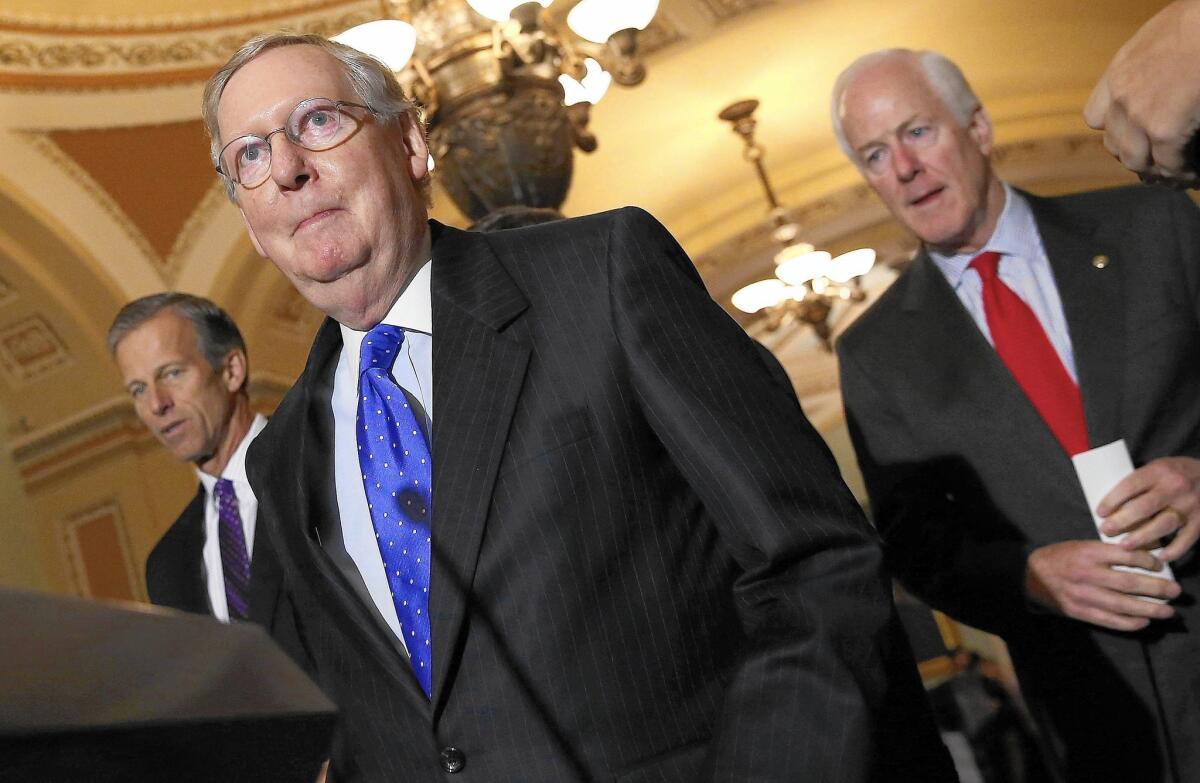House turmoil jeopardizes debt deal

Senate Majority Leader Mitch McConnell (R-Ky.) arrives to answer questions after a weekly policy meeting at the U.S. Capitol.
- Share via
WASHINGTON — The effort to raise the federal government’s debt limit is in disarray as the deadline nears, increasing the risk of a default.
Senate Majority Leader Mitch McConnell said this week he would wait for the House to pass legislation boosting the $18.1-trillion limit before the Treasury Department runs out of borrowing authority Nov. 3.
But the House Republican majority is in chaos as it works through proposed solutions that have little chance of becoming law while trying to decide on who will succeed departing Speaker John Boehner (R-Ohio).
On Wednesday, the House voted 235 to 194 to approve a bill that would authorize the Treasury Department to exceed the debt limit only to pay principal and interest on government bonds as well as to make Social Security payments should a broader increase not be approved in time.
Only Republicans voted for the bill. All the Democrats voting, along with nine Republicans, opposed it.
“We may disagree over the appropriate role of Congress in adjusting the debt limit, but at least, can’t we all agree that during these disputes, the sovereign debt of the United States is never in doubt?” the bill’s sponsor, Rep. Tom McClintock (R-Elk Grove) said in asking Democrats for support.
President Obama strongly opposes the legislation.
“Such an approach would be the equivalent of a family saying that it will choose to pay its mortgage but not its car payment, credit card or student loans, and expecting that its creditworthiness will not suffer,” the White House said in a memo to Congress warning that Obama would veto the bill.
On Friday, the House is expected to vote on another bill pushed by the conservative Republican Study Committee that would raise the debt limit by $1.5 trillion in exchange for sweeping changes to how Congress handles spending issues.
The legislation likely would be blocked by Senate Democrats and is destined for another veto threat from Obama.
Democrats said the House votes this week are wasting valuable time as the deadline approaches.
The federal government technically reached its debt limit in March, but Treasury officials have been using so-called extraordinary measures to juggle the nation’s finances and continue borrowing.
Those measures will be exhausted Nov. 3 at the latest. At that point, the Treasury would have to depend on about $30 billion in cash and incoming revenue to pay its bills and would be at risk default in the following days.
Many Republicans want concessions on future spending from Obama in exchange for increasing the debt limit. But Obama has vowed not to negotiate because the additional borrowing is needed to pay for spending Congress already has authorized.
Boehner, who plans to retire at the end of the month, has signaled he’s ready to try to advance a debt-limit bill with no conditions attached and depend on Democrats to help pass it.
Senate Republicans prefer spending concessions on a debt-limit bill, said McConnell (R-Ky.). But he also has promised to avoid a government default. So with time running out and turmoil on the other side of the U.S. Capitol, McConnell on Tuesday said, “We’ll have to see what the House sends over, and we’ll act accordingly.”
Even with the support of all 188 House Democrats, Boehner would need 30 Republican votes to pass a debt-limit increase. The last time the limit was raised, in early 2014, just 28 Republicans voted for it. Nine of those lawmakers are no longer in Congress.
The votes this week on conservative debt-limit bills might be needed to appease some Republican lawmakers so they would agree to support Boehner on a no-strings-attached increase.
Given strong opposition as well from Senate Republicans, it could take three days to pass such a bill there. So if the House does not pass a debt-limit bill soon, Congress would be up against the Nov. 3 deadline.
Sen. Richard J. Durbin (D-Ill.) said Republicans “may get around” to passing a debt-limit increase “after they’ve figured out who’s going to be the speaker.”
“But each day as we draw closer to this deadline,” he said, “it’s at the expense of our economy, the expense of jobs, the expense of economic growth and the expense of the American people.”
MORE ON BUSINESS
YouTube launches subscription service for $9.99 a month
Western Digital to buy SanDisk for $19 billion
Fresh & Easy begins closing down stores
More to Read
Inside the business of entertainment
The Wide Shot brings you news, analysis and insights on everything from streaming wars to production — and what it all means for the future.
You may occasionally receive promotional content from the Los Angeles Times.











